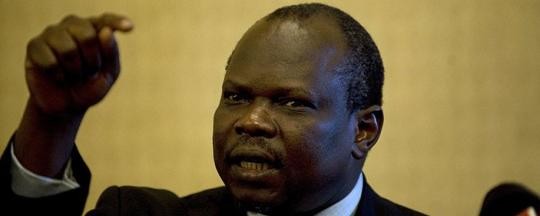The former SPLM Secretary-General Pagan Amum has criticized the government for blocking PPLF leader Lam Akol from taking part in South Sudan’s peace negotiations and rejected the involvement of another delegation that claims to represent PPLF.
PPLF, the Political Parties Leadership Forum, is an association of non-armed opposition groups based in Juba.
The country’s Cabinet Minister has been involved in a public effort to wrestle control of the group from Lam Akol and give it to Martin Tako Moi.
A delegation under Moi arrived at the talks on Saturday, having traveled to Ethiopia of their own accord and without the facilitation of the IGAD mediation.
“We do not agree on their participation in the talks,” said Pagan Amum, the head of the SPLM-Leaders (‘Former Detainees’) delegation, explaining that Lam Akol is the legitimate leader of the PPLF delegation and not Martin Tako.
In an interview with Radio Tamazuj on Sunday, Pagam Amum stated that they will not accept the participation of the newly arrived delegation.
He called on the South Sudanese government to allow Lam Akol to travel to Ethiopia saying, “First of all, Lam Akol is the head of the second biggest party in the parliament. He is the head of the main opposition party in South Sudan.”
Pagan said the politician’s absence “will definitely affect the negotiations and will hamper national consensus.”
For his part, Martin Tako Moi told Radio Tamazuj on Sunday that his delegation arrived late because the IGAD mediation did not send them airplane tickets.
He blamed the IGAD for not sending their tickets on time, saying they came at their own expense.
The politician, who chairs the United Democratic Salvation Front, admitted there have been differences within the PPLF, prompting the removal of Lam Akol from the PPLF leadership.
He said the absence of Lam Akol will not affect their participation at the peace talks.
Pagan calls for national dialogue
Pagan Amum called for the initiation of national dialogue based on an agreement starting with two phases.
“The first phase is the transition and the second is what we call permanent system in order to put an end to the current crisis,” he noted.
He described the national dialogue as a process that will ensure healing of the rupture caused by divisions among the SPLM leaders.
The formation of a transitional government will not be enough, he asserted, saying the system of governance needs to be restructured and other root causes of the conflict addressed.
“There should be an agreement on a transitional program in order to deliver relief to conflict-affected citizens and resettlement of conflict-displaced persons and refugees,” he said.
Pagan also emphasized constitutional reform. He urged the people of South Sudan to cooperate with the African Commission of Inquiry to investigate the crimes committed during the conflict and make sure that justice takes its course.
He pointed out the position of the SPLM-Leaders was to shun violence instigated by the government in Juba in an attempt to silence voices calling for reform within the SPLM party.
He further warned that the ongoing war will dismantle the social fabric in South Sudan.



